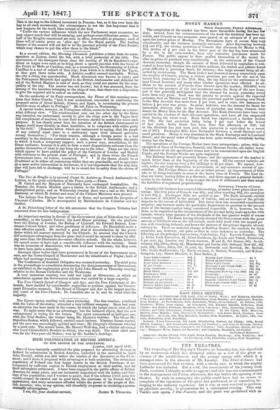In a second edition, the Morning Chronicle publishes a letter
from its corre- spondent at Lisbon, dated the kb, with a brief postscript of the 10th. The movements of the insurgent forces since the landing of Sii da Bandeira's expe- dition at Lagos were such as to bring about a speedy junction with the forces of the Count de Mello at Cradles and as a consequence, the threatening of Lisbon. Caxialhas is a sort of suburb of that city; from which it is divided by the Tagus, at that part three miles wide. A decisive conflict seemed inevitable. Within the city a rising was apprehended. Much discontent was known to exist; and the Portuguese Ministers had applied to the British Ambassador and Admiral for aid of the British Marines in case of need, as they could not answer for the tran- quillity of the city. The answer was not known; but it was assumed, from the arming of the launches belonging to the ships of war, that there was a disposition to give the required aid in case of an outbreak.
On the authority of its Paris correspondent, the Times of this morning men- tions that Senor Concha "had, it was understood, succeeded in confirming the proposed union of Great Britain, France, and Spain, in terminating the present horrible state of affairs in Portugal." He left Paris on Wednesday. A special leader, however, on Portuguese affairs, seems to be written on a some- what different view. "The reinforcement sent out the other day by the Sidon was intended, we understand, merely to give the ships now in the Tagus their fall complement of marines, in case their services should be needed for some such purpose. It has clearly never been the intention of the British Government to engage itself more directly in these hostilities or to cooperate with either party in the field." [Remarks follow which are tantamount to saying, that the people of any country must come to a settlement upon their internal questions among themselves.] "For these reasons, although a foreign power is a bad auxiliary in the domestic convulsions of a state, because it discredits the party to which it lends a temporary support, such a power may, nevertheless, be the fittest mediator; because it is able to form a more dispassionate estimate than the parties themselves of what is due from the one to the other. These are the views which appear to have guided the policy of the Cabinets of London and Madrid with reference to the present state of Portugal; and in these views the French Government have, we believe, concurred. * * * If the Queen should be so ill-advised as to refuse all concessions whilst they are practicable, and to speculate on a more active intervention in her favour, it is not improbable that the only duty they will have left to discharge, will be to escort her in safety from the shores of Portugal."


























 Previous page
Previous page